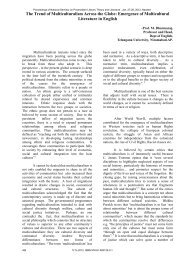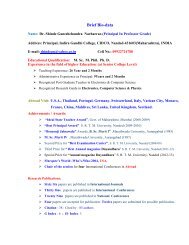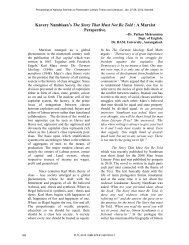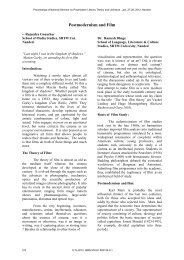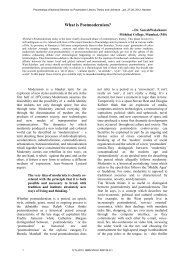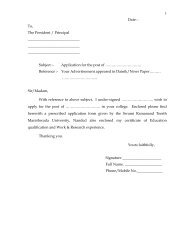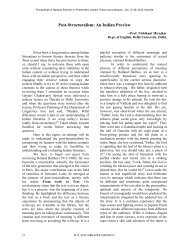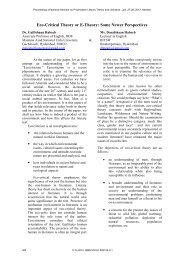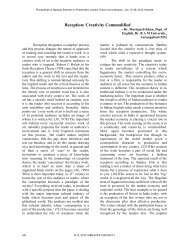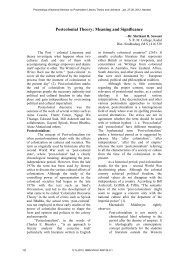Postcolonial Feminist Theory: An Overview - Igcollege.org
Postcolonial Feminist Theory: An Overview - Igcollege.org
Postcolonial Feminist Theory: An Overview - Igcollege.org
You also want an ePaper? Increase the reach of your titles
YUMPU automatically turns print PDFs into web optimized ePapers that Google loves.
Proceedings of National Seminar on Postmodern Literary <strong>Theory</strong> and Literature , Jan. 27-28, 2012, NandedReflection of <strong>Feminist</strong> <strong>An</strong>ger against Gender Discriminations inArundhati Roy’s The God of Small Things--Mothe Prashant SubhashraoAdarsh Senior College,Omerga. Dist.Osmanabad(MS)Arundhati Roy’s debut novel ‘TheGod of Small Things’ rapidly become a worldrenowned literary sensation after it waspublished in New Delhi in 1997 and wonprestigious Booker Prize Award. ‘The God ofSmall Things’ is a protest novel which isradical, subversive, unconventional and taboobreaking.It is in this sense that the novelwould be read as a post-colonial novel becauseit aims at destroying the old power-structure.Roy expresses her disillusionment with thesocial conditions of the post-colonial world inwhich the untouchables of the past still face ahostile society that does not let them live asfree and independent individuals.Roy vividly portrays the acutesuffering and deep frustration of the weakersections of our society like the Paravans, theScheduled Castes, the Scheduled Tribes, Dalitsand so on. The Paravan, Velutha, whom wemay call the male protagonist of the novel, islooked down upon almost at every stage in hislife. As a small boy, when he visits theAyemenem House in the company of hisfather to deliver the coconuts plucked from thetrees in the compound, they come from theback entrance and later as a mature man, he isfalsely implicated in a case of attempted rapeof Ammu.Roy powerfully portrays the miserablecondition of the Paravans in The God of SmallThings. Here discrimination expresses itself inmarginalizing the ‘untouchables’ in theirpersonal and public life. A completeappreciation of ‘The God of Small Things’requires an awareness of the caste system inKerala. The community represented in TheGod of Small Things is Syrian Christian. TheChristians of Kerala are divided into fivecategories: Roman Catholic, Orthodox Syrian,Nestorian, Marthoma, and <strong>An</strong>glican. In thenovel religions differences appear in thedisagreements between the Roman CatholicChurch and the Marthoma Church. Roy pointsout number of Paravans and members of otherlow castes converted to Christianity, they weremade to have separate churches and thuscontinued to be treated as Untouchables. Royaptly put in plain words as, “It was a little likehaving to sweep away your footprints with abroom or worse, not being allowed to leaveany footprints at all” (p.57). AfterIndependence, they were denied governmentbenefits created for ‘untouchables’ becauseofficially they were Christians and thereforeCasteless. “They were not entitled to anyGovernment benefits like job reservation orbank loans at low interest rates” (p.71).Velutha, the Paravan, can perhaps becalled the hero of the novel and he is the ‘God’in The God of Small Things. He is a carpenter,a rebel, a trade unionist. Velutha is highlyintelligent an excellent carpenter with anengineer mind, but he is also ‘The God ofLoss’.Roy articulates, “He left no footprints in sand,no ripples in water, no images in mirrors”(p.265). The untouchables were made to sufferhumiliations at the hands of the Hindus andChristians. On the one hand we have a groupof characters, Mammachi, Baby Koachammaand Kochu Maria the cook, who perpetuate thedivision of caste, race and gender. On theother hand, Ammu and Twins, Rahel andEstha, consciously and unconsciously resistthese hierarchies. Roy throws light on,“Perhaps Ammu, Estha and Rahel were theworst transgressors. They all broke therules…they all tampered with laws that laydown who should be loved and how. Howmuch” (p.31).Mammachi discovered Velutha’stalent for carpentry when he was just eleven,about three years younger than Ammu. Sheenrolled him into the Untouchable School thatwas started by her father-in-law. Everyafternoon after school Velutha worked withJohn Kelin, a carpenter in Bavaria and learntcarpentry. But his self-assurance disturbed hisfather, Vellya Pappen. As a result of familybickering, Velutha left home. Apart from hiscarpentry skills, Velutha had a way with themachines. Mammachi often said, “If only hehadn’t been a Paravan, he might have been an365 PLTL-2012: ISBN 978-81-920120-0-1



